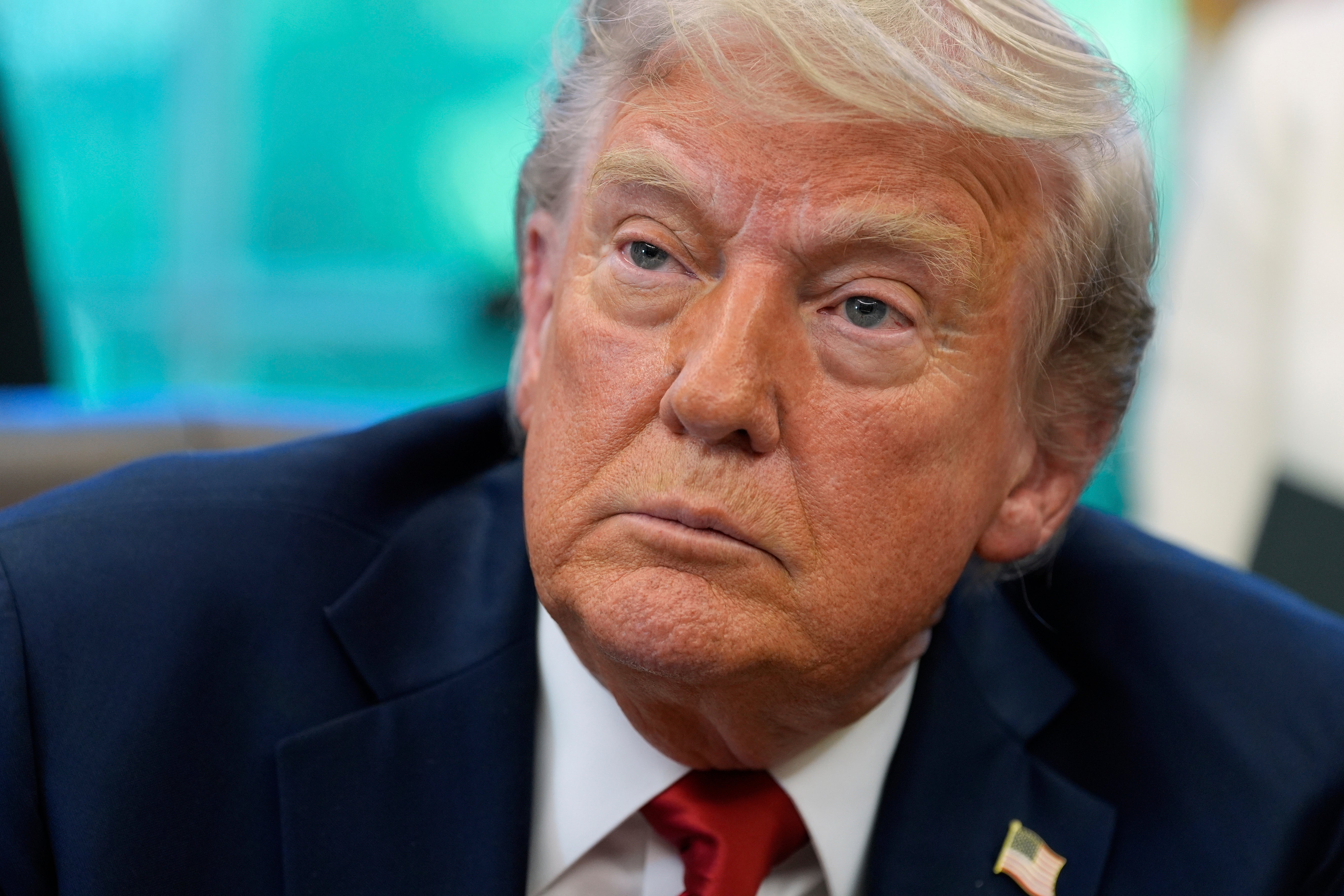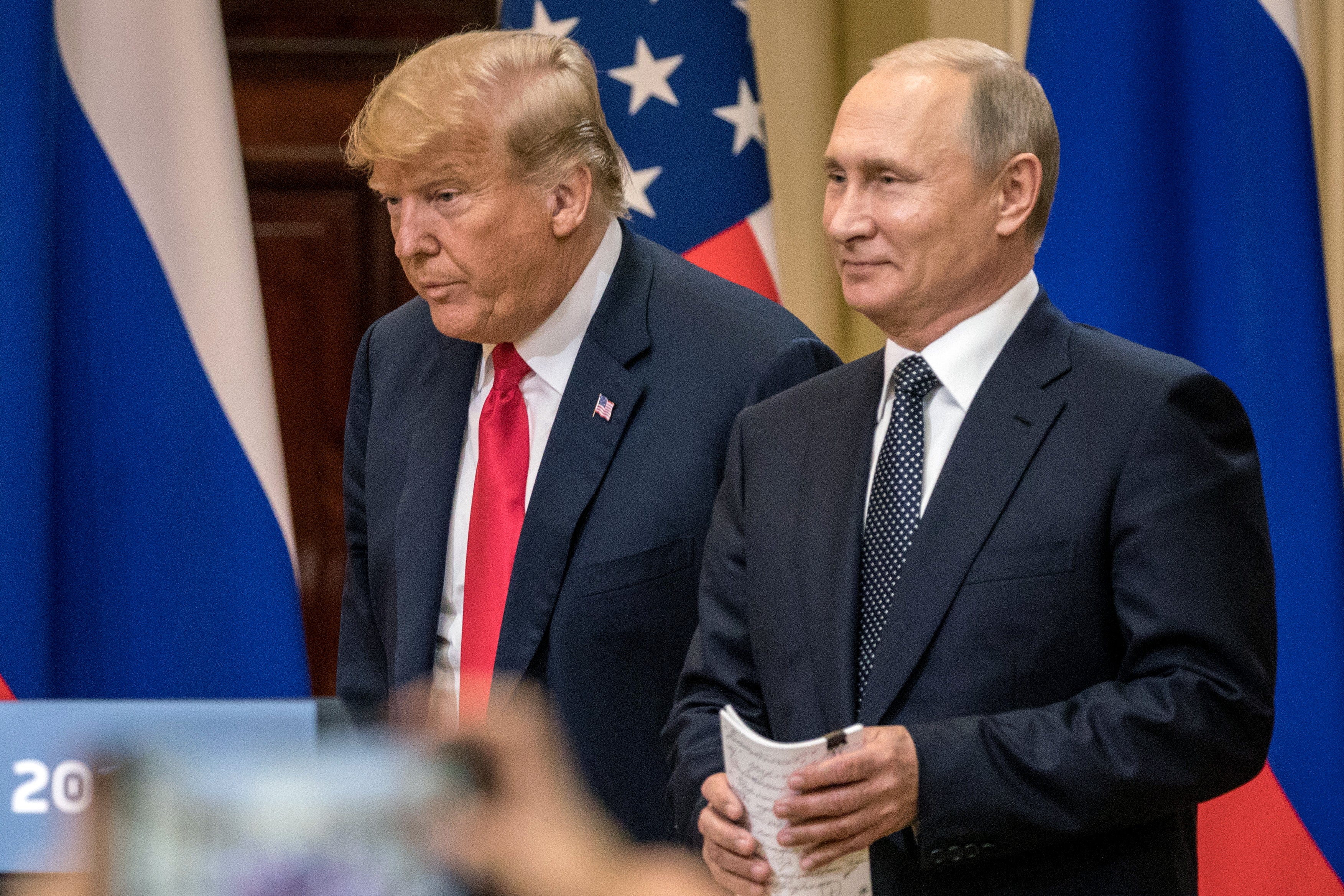If Trump’s hatred of Zelensky feels personal, that’s because it is
As the US president lashes out at the Ukrainian leader once again, it can sometimes feel as though personal hostility is clouding his judgement. Sam Kiley examines a long-held grudge against Zelensky – and how it may be getting in the way of defending democracy against tyranny

Donald Trump has already cast himself as a “great man’ of history. His influence is felt not only now, but will likely endure for decades. Yet, as he stands astride Europe, upending nearly a century of alliances, he finds himself eclipsed by a man of smaller physical stature. And it’s getting to him.
Yesterday, America’s ‘big man’ once again lashed out at the diminutive Ukrainian president Volodymyr Zelensky. Warning that Zelensky would “lose his country” if he refused to accept a peace deal, Trump accused him of prolonging the “killing field” after Zelensky declined to cede Crimea to Vladimir Putin as part of a potential settlement.
Claiming the territory had been lost for good in 2014 and was not up for discussion, Trump reserved his harshest criticism not for the aggressor who invaded a neighbouring sovereign state, but for the leader defending it. And if it all feels personal, that’s because it is.
The narcissism of America’s 47th president has long been one of Vladimir Putin’s greatest assets. As a former head of the Federal Security Service – successor to the KGB and expert in personality profiling and manipulation – Putin understands that the fragile ego behind the resolute desk is a potent weapon for the Kremlin.
In his latest attack on the widely respected Zelensky, Trump echoed Russia’s claims to Crimea – once the headquarters of the Soviet Black Sea Fleet, ceded to Ukraine in 1954.
Trump likes to imagine himself in the 19th-century mould of the “great man” – a history-maker. It explains his fascination with North Korea’s Kim Jong-un during his first administration, and his repeated and blatant oiling up to Putin today. But while Trump revels in membership of the “great man” club, he resents true heroes. To him, even American soldiers who gave their lives in service are “losers”.
Zelensky, by contrast, has captured the global imagination as a symbol of underdog courage against the Russian bear – and Trump detests him for it. The standing ovations and roars of praise that follow the Ukrainian leader, even on Capitol Hill, must make Trump’s ears bleed.
And Trump has form when it comes to Zelensky – and his infuriating insistence on principle. The Ukrainian president, elected by a landslide, was first painted as a traitor to Trump’s cause when he refused to assist in digging up dirt on Hunter Biden, the son of Joe Biden – then the likely Democratic candidate.
Trump viewed Zelensky as an ungrateful recipient of American aid for failing to launch an investigation into Hunter Biden’s business dealings in Ukraine in July 2019. Trump was later impeached by Congress over allegations he had threatened to withhold nearly $400m in US military aid unless Zelensky helped his re-election campaign. Although acquitted by the Senate, the damage was done – and the grudge was born. Since then, we have witnessed its ugly expression time and again.

It is hard to imagine another world leader subjected to the kind of personal and vicious public attack Zelensky endured in the White House.
So the question remains: has this personal animosity pushed America to the brink of choosing tyranny over democracy?
Trump’s ties to Moscow stretch back to 1987, when he first visited the Soviet capital to explore investment opportunities. Although he never completed any deals in Russia, his enterprises have reportedly received backing from Russian financiers. Putin was in east Germany in 1987, but it is certain that Trump was of considerable interest to his colleagues in the Soviet regime that first invited him to Moscow. The KGB/FSB are among the most skilled at secret surveillance in the world.
Given his long history of friendship with Russia and his personal hatred of Zelensky, Trump’s claim that “I have nothing to do with Russia, but have much to do with wanting to save, on average, five thousand Russian and Ukrainian soldiers a week, who are dying for no reason whatsoever”, rings hollow.
Zelensky was elected by 73 per cent of the Ukrainian electorate – a figure that clearly irritates Trump, who has never reached that level of support and whose popularity continues to slide
Trump supports Russian G7/8 membership. He refused to put tariffs on Moscow this month. He has adopted every one of Russia’s initial negotiating principles as his own when it comes to Ukraine, and said he thought that the country may “be Russian one day”. He wants to get back into doing business with Russia, too.
Trump has insisted he is putting pressure on Russia’s Vladimir Putin, hours after lambasting him for pounding Kyiv overnight, writing on social media: “I am not happy with the Russian strikes on KYIV. Not necessary, and very bad timing. Vladimir, STOP! 5000 soldiers a week are dying. Lets get the Peace Deal DONE!” But his latest so-called “peace plan” offers carrots to the Kremlin and a stick to Kyiv: Ukraine must cede 20 per cent of its territory (including Crimea), abandon Nato ambitions, and give the US half its natural resources – all in exchange for a “peace” with no guarantees against future Russian invasions. Someone ought to explain to him the difference between a peace deal and a surrender.
Trump has labelled Zelensky a “dictator, without elections”, and claimed he had just 4 per cent approval. In fact, Zelensky was elected by 73 per cent of the Ukrainian electorate – a figure that clearly irritates Trump, who has never reached that level of support and whose popularity continues to slide. Zelensky’s current approval rating stands at around 57 per cent – that must hurt.

Ukraine, a Western democracy seeking EU membership, is a sovereign nation. Putin has openly declared ambitions to reclaim it for a new post-Soviet empire, and has also set his sights on the Baltic states, Moldova, and Romania.
Support for Ukraine is a necessary condition of Europe’s defence. America’s network of allies in Nato and beyond has been the weft of Washington’s tapestry of alliances that has made it a global superpower.
To Trump, though, it’s getting in the way of turning the world into spheres of influence in which the US, Russia, and China carve up the planet. That just so happens to be Putin’s vision, too.
That’s “big man” thinking. And a little guy in khaki? He’s just in the way.



Join our commenting forum
Join thought-provoking conversations, follow other Independent readers and see their replies
Comments